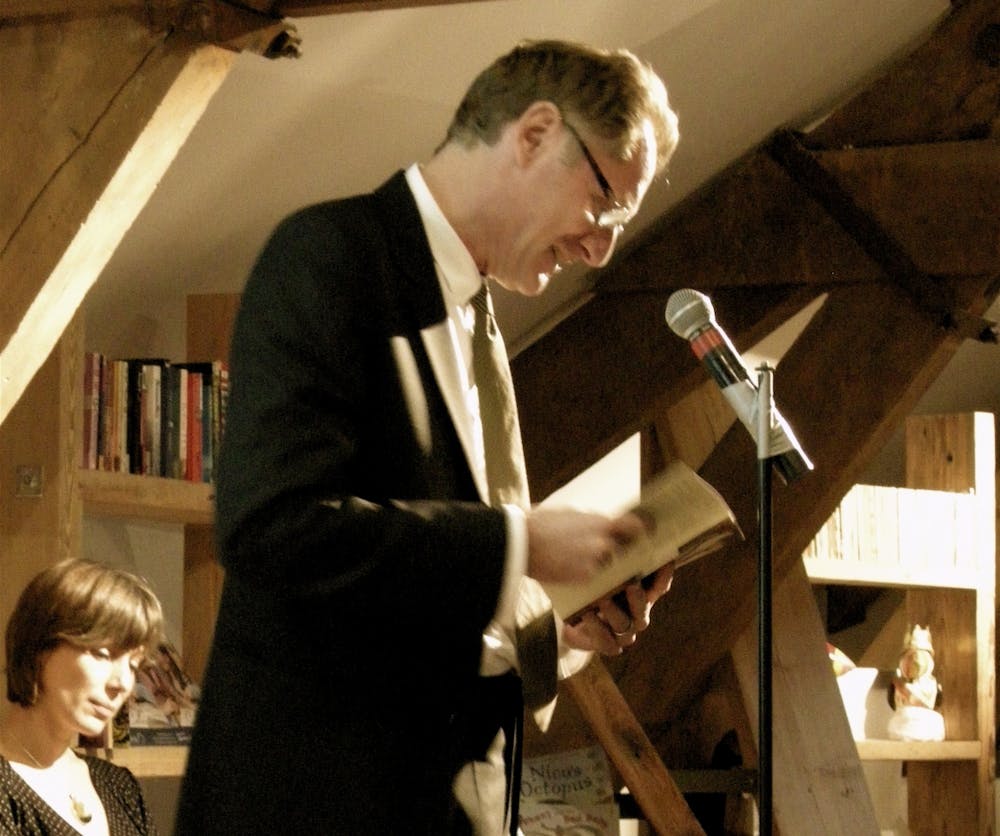Sir Andrew Motion is a professor of the arts at Hopkins’ Writing Seminars program and an English poet. Motion was the United Kingdom’s Poet Laureate from 1999 to 2009 and is the co-founder of the Poetry Archive. He was knighted by Queen Elizabeth II in 2009. In an interview with The News-Letter, Motion discussed his life path as a poet in the U.K. as laureate to his current position at Hopkins, as well as his understanding of the meaning of poetry.
The News-Letter: You were the Poet Laureate from 1999 to 2009. What did it mean to you, both professionally and personally?
Andrew Motion: It is a very long-established position in the United Kingdom. To be invited to join that long line of succession was very honoring. When I took over, I felt the position needed reforming — in a respectful spirit.
The way that I set about doing that was to effectively divide the job into two bits in my mind's eye. There’s a writing bit because there's always been the expectation that the laureate will write about events in the calendar. I did write — I tried to broaden the writing description to include things in the life of the nation. The second bit of the job was working for poetry. I went to see a very large number of schools to infuse, or reinfuse, [poems into] teachers and students. I tried to make conversation about poetry on the radio, on the television, anywhere I could make it happen so that the voice of poetry joins the national conversation.
N-L: Traditionally, the Poet Laureate retains the position for life. What was the reasoning behind your self-imposed 10-year cut off?
AM: I wanted to do it for a limited period because I thought it would be a good thing for somebody else to take over. More selfishly, I didn't want its obligations to be permanent in my life. By the time I'd done my 10 years, I felt proud of what I'd done but very pleased to stop doing it.
N-L: You received your knighthood from Queen Elizabeth II in the 2009 Queen's Birthday Honours list. What was the experience like?
AM: It was very honoring of course. It was also bizarre because the circumstances were a bit peculiar. I was given such fantastically detailed instructions about how to walk across the room, when to kneel, what to do with my hand and so on. By the time I got to do it, I'd almost forgotten how to walk. The nicest thing about it, from my point of view, was that my children were able to watch, and we all had a memorably nice lunch afterwards.
N-L: What was the intention behind founding the Poetry Archive?
AM: First, it was really to make poems seem more and more a part of life. Second, I'm a great believer that the meaning of a poem, whatever it might be, has as much to do with the noise and sound that a poem makes as it does with the meaning of the words written on the page. It was those two things that drove me to set the Archive up with my friend Richard Carrington.
A lot of the time, people say that nobody reads poems anymore, and, [if you] look at the falling sales of poetry books, that's true. But every month, a quarter million people listen to poems on the Poetry Archive, and I'm sure the figures of the Poetry Foundation website are even larger than that. So, we might actually be able to say that there are more people reading poems now than ever before in the history of the human race. New technology has been a very good friend of poetry.
N-L: Where do you find inspiration for your poetry?
AM: The best definition of the early stages of a poem I’ve come across is Robert Frost’s remark that poetry begins with a lump in the throat, a homesickness, a lovesickness. In other words, poetry for me begins with a very inarticulate but profound feeling of loss or unfinishedness. When I prod it, it starts to come to life. I drag it into the front of my mind, then words start to attach themselves to meaning. The process is an odd mixture of knowing what you're up to and not having a clue. I believe the act of writing requires a fine balance between those two elements.
N-L: Why did you decide to work as a professor at Hopkins? What has teaching Hopkins students given you?
AM: When I stood down as laureate, I immediately got invited to do a lot of other things, and I found myself quickly sitting on what felt like endless committees, not to mention a very large number of literature-associated things. While I was really pleased to be a part of all of them, I found that I'd had as little time for my own work as I'd had during my time as laureate. By making a decisive break with things by moving to another country, I wanted to give myself a chance to concentrate on my writing. I love my teaching. I take it extremely seriously. I'm very pleased to have this job, but I'm also very pleased to have a bit more time for my own work. I'm 70 years old now, and how many more books am I going to write? Probably not that many, and I just want to make sure they're as good as I can make them.
It suits me to feel slightly dissociated from my setting. A lot of writers feel like they're at a slight angle to everything. Everything I see here, even though I’m now an American citizen, feels slightly odd, and, therefore, it's more visible and more writable to me.
I like the commitment and enthusiasm of my students very much even though they have a vast amount of other things to do because of the way that university courses are structured in this country. I often feel that they haven't been very well served by the American school system in terms of their reading. Part of my job here is to try and fill in those gaps.
It's through reading that we develop our capacity to put ourselves in other people's shoes because the things that we're reading invite us to see the world from a different point of view. It's an innately liberalizing thing.
N-L: If you had to live in one of your poems, which one would you choose?
AM: My poems are rather sad. A lot of them are thinking about death or dead people, so I'm not crazy keen on living in any of them in that respect. A serious answer to your question is I would like to live in one of the poems I wrote about early childhood because, as far as I can remember, I was happy then. Not that I'm exactly unhappy now. But it is in childhood that we see things with more clarity than we ever do in later life. I'm conscious all the time when I'm writing to recapture that child’s clarity of vision and that sense of being surprised as a child is by things that an adult thinks are quite ordinary.





